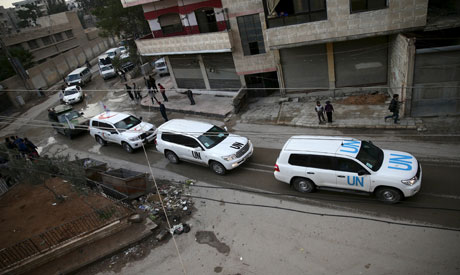
An aid convoy of Syrian Arab Red Crescent and UN drives through the rebel held besieged city of Douma towards the besieged town of Kafr Batna to deliver aid, on the outskirts of Damascus, Syria February 23, 2016. (Photo: Reuters)
The United Nations voiced concern on Thursday over growing difficulties in delivering aid to besieged areas in Syria, with convoys delayed or surgical equipment being removed, mainly by government forces.
Jan Egeland, chairman of a UN task force on humanitarian aid, called on Syrian President Bashar al-Assad's main allies Russia and Iran to bring more pressure to bear on the government to enable deliveries of food and medicines.
"We still have not gotten access, a green light to go at all to Douma, Daraya, east Harasta," he told reporters after major and regional powers held a weekly meeting to review progress during the month-long ceasefire.
More than 90,000 people in need are trapped in government-besieged Douma, while conditions in Daraya are "horrendous for the relatively few civilians who are still there", he said.
The United Nations has reached 150,000 people living in 11 of 18 besieged areas in Syria, out of a total of nearly 500,000 people in need.
But Egeland said Damascus has been less responsive to requests for aid convoys than it was after world powers agreed in Munich in early February to a cessation of hostilities to allow aid to be delivered.
"It's like there are less answers, less quick answers, less momentum, less dynamics in the situation than we had immediately after the ministerial meeting in Munich," he said. "We must be able to get to the remaining besieged areas."
Egelund said three children in government-besieged Madaya bled to death earlier this week because they could not be evacuated for medical treatment after an unexploded bomb they were playing with exploded.
"Those children should have been alive today," he said.
But he said he believed the UN World Food Programme would be able to start regular air drops of vital supplies to 200,000 people trapped in Islamic State group-besieged Deir al-Zor in the next two weeks.
Short link: